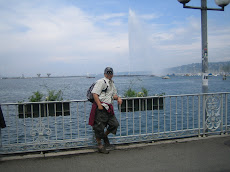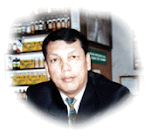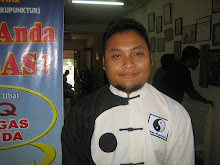Friday, November 18, 2011
Tibb Al Nabawi - Treatment - Anger and Its Therapy
Anger and its Therapy
Abou Hurairah (May Allah be pleased with him) narrated that the Prophet Mohammed (PBUH) said: “The strong is he who controls himself, not the one who has a harsh strike.”
Also Abou Hurairah (May Allah be pleased with him) narrated that “A man addressing the Prophet (PBUH) said: ‘Advice me.’ The Prophet said: ‘Do not ever be angry.’ The man reiterated his request a couple of times; but the Prophet said: ‘Do not ever be angry.’” (see Saheeh Al-Bukhari: “Ethics”. 6114-16).
The Prophet’s statement “The strong is not the one who has a harsh strike” means the one who smites others with his strength.
The statement “the man reiterated his request a couple of times” indicates that the man was attempting to seek a better advice or something more beneficial or of a general nature.
But the Prophet added nothing except what he had already said.
Ahmed and Ibn Habban elaborated on the issue by saying that an anonymous man said: “Reflecting on what the Prophet said, one is likely to find that anger combines all evils.”
Al-Khatabi said that the Prophet’s “ Do not ever be angry,” means one’s eschewing any causes or reasons provoking rage.
Ibn Battal elaborating on the Hadeeth indicated “Controlling oneself is more difficult than fighting an enemy, and accordingly the Prophet described the one who controls himself as the strongest of all.
Also it is most probable that the requester was easily provoked to anger. The Prophet (PBUH), hence, used to give an advice in relation to the flaw of the advisee; the Prophet’s advice was briefed to encourage the man to turn away from anger. In fact, anger brings about immense wicked doings.
Anyone who realizes the negative consequences of anger is likely to appreciate the great value and divine wisdom behind this soft and beautiful saying: “Do not ever be angry.” Not only that, one would realize the advantages of this advice in preventing the occurrence of wrong doings" (See Fateh Al-Bari (Allah’s Guidance) 10:520).
Moreover, the Prophet did not simply display an ailment, but he prescribed the correct and absolute therapy for such a weakness. In a Hadith narrated by Ahmed, Abu Da’oud, and Ibn Hebban the Prophet PBUH said: “If provoked to anger while standing up, one must sit down; if anger is not turned away, one must lie down.”
Then,
- What are the consequences of anger on man?
- Why did the Prophet PBUH prescribe such a remedy?
- What is the effect of standing up and laying down on anger?
The answer for these three questions is contained in the function of the two adrenal glands, one at the upper end of each of the kidneys. One of their functions is producing the hormones adrenaline and noradrenaline.
Thus, if one has any heart problems, he should avoid being made angry. This is because adrenaline hormone impacts the heart by hastening its beats and causing its disorder.
Accordingly, anger, agitation, and nervousness are likely to bring disorder of heartbeats, a fact which is realized and can easily be noticed in patients with heart problems.
Further if one suffers from high-blood pressure, one should avoid being made angry. This is for rage raises the ratio of these two hormones in the blood, causing hypertension. The Prophet PBUH repeats thrice “Don’t ever be angry.” while physicians advise patients with high blood pressure to avoid agitation, nervousness, and anger.
Those patients suffering from artery diseases should also avoid being provoked to anger, for this would likely bring about a heart attack.
If suffering from diabetes, patients should not get angry as well, for adrenaline causes the increase of sugar in the blood.
Eventually, it was medically and scientifically proven that the ratio of these hormones is reduced by laying down as has been pointed out by the Prophet PBUH in his saying: “If provoked to anger while standing up, one must sit down; if anger is not turned away, one then must lie down.”
[Extracts from The Prophetic Medicine]
Reference: Tihmaz, Abdulhameed Mahmoud. The Forty Scientific Miracles. Dar Al-Qalem.
Abou Hurairah (May Allah be pleased with him) narrated that the Prophet Mohammed (PBUH) said: “The strong is he who controls himself, not the one who has a harsh strike.”
Also Abou Hurairah (May Allah be pleased with him) narrated that “A man addressing the Prophet (PBUH) said: ‘Advice me.’ The Prophet said: ‘Do not ever be angry.’ The man reiterated his request a couple of times; but the Prophet said: ‘Do not ever be angry.’” (see Saheeh Al-Bukhari: “Ethics”. 6114-16).
The Prophet’s statement “The strong is not the one who has a harsh strike” means the one who smites others with his strength.
The statement “the man reiterated his request a couple of times” indicates that the man was attempting to seek a better advice or something more beneficial or of a general nature.
But the Prophet added nothing except what he had already said.
Ahmed and Ibn Habban elaborated on the issue by saying that an anonymous man said: “Reflecting on what the Prophet said, one is likely to find that anger combines all evils.”
Al-Khatabi said that the Prophet’s “ Do not ever be angry,” means one’s eschewing any causes or reasons provoking rage.
Ibn Battal elaborating on the Hadeeth indicated “Controlling oneself is more difficult than fighting an enemy, and accordingly the Prophet described the one who controls himself as the strongest of all.
Also it is most probable that the requester was easily provoked to anger. The Prophet (PBUH), hence, used to give an advice in relation to the flaw of the advisee; the Prophet’s advice was briefed to encourage the man to turn away from anger. In fact, anger brings about immense wicked doings.
Anyone who realizes the negative consequences of anger is likely to appreciate the great value and divine wisdom behind this soft and beautiful saying: “Do not ever be angry.” Not only that, one would realize the advantages of this advice in preventing the occurrence of wrong doings" (See Fateh Al-Bari (Allah’s Guidance) 10:520).
Moreover, the Prophet did not simply display an ailment, but he prescribed the correct and absolute therapy for such a weakness. In a Hadith narrated by Ahmed, Abu Da’oud, and Ibn Hebban the Prophet PBUH said: “If provoked to anger while standing up, one must sit down; if anger is not turned away, one must lie down.”
Then,
- What are the consequences of anger on man?
- Why did the Prophet PBUH prescribe such a remedy?
- What is the effect of standing up and laying down on anger?
The answer for these three questions is contained in the function of the two adrenal glands, one at the upper end of each of the kidneys. One of their functions is producing the hormones adrenaline and noradrenaline.
Thus, if one has any heart problems, he should avoid being made angry. This is because adrenaline hormone impacts the heart by hastening its beats and causing its disorder.
Accordingly, anger, agitation, and nervousness are likely to bring disorder of heartbeats, a fact which is realized and can easily be noticed in patients with heart problems.
Further if one suffers from high-blood pressure, one should avoid being made angry. This is for rage raises the ratio of these two hormones in the blood, causing hypertension. The Prophet PBUH repeats thrice “Don’t ever be angry.” while physicians advise patients with high blood pressure to avoid agitation, nervousness, and anger.
Those patients suffering from artery diseases should also avoid being provoked to anger, for this would likely bring about a heart attack.
If suffering from diabetes, patients should not get angry as well, for adrenaline causes the increase of sugar in the blood.
Eventually, it was medically and scientifically proven that the ratio of these hormones is reduced by laying down as has been pointed out by the Prophet PBUH in his saying: “If provoked to anger while standing up, one must sit down; if anger is not turned away, one then must lie down.”
[Extracts from The Prophetic Medicine]
Reference: Tihmaz, Abdulhameed Mahmoud. The Forty Scientific Miracles. Dar Al-Qalem.
Subscribe to:
Post Comments (Atom)

























No comments:
Post a Comment